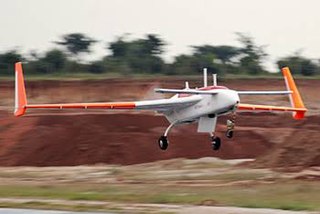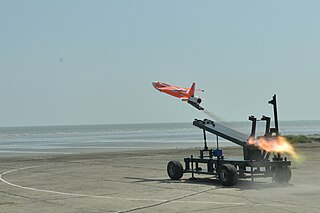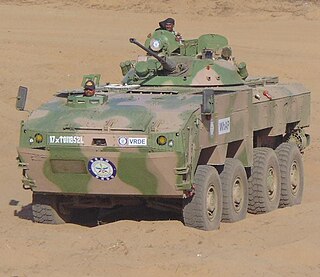
The Arjun is a third generation main battle tank developed by the Combat Vehicles Research and Development Establishment (CVRDE) of the Defence Research and Development Organisation (DRDO), for the Indian Army. The tank is named after Arjuna, the archer prince who is the main protagonist of the Indian epic poem Mahabharata. Design work began in 1986 and was finished in 1996. The Arjun main battle tank entered service with the Indian Army in 2004. The 43rd Armoured Regiment, formed in 2009, was the first regiment to receive the Arjun.

Akash is a medium-range mobile surface-to-air missile (SAM) system developed by the Defence Research and Development Organisation (DRDO) and produced by Bharat Dynamics Limited (BDL). Surveillance and Fire control radar, tactical control and command center and missile launcher are developed by Bharat Electronics Limited (BEL), Tata Advanced Systems Limited and Larsen & Toubro. The Akash missile system can target aircraft up to 45 km (28 mi) away. It has the capability to neutralise aerial targets like fighter jets, cruise missiles and air-to-surface missiles. It is in operational service with the Indian Army and the Indian Air Force.

Pinaka is a multiple rocket launcher produced in India and developed by the Defence Research and Development Organisation (DRDO) for the Indian Army. It is also called India's Grad missile system as it's characteristics are derived from BM-21 Grad. The system has a maximum range of 45 km (28 mi) for Mark-I Enhanced and 90 km (56 mi) for Mark-II ER version, and can fire a salvo of 12 HE rockets per launcher in 44 seconds. The system is mounted on a Tatra truck for mobility. Pinaka saw service during the Kargil War, where it was successful in neutralising Pakistani positions on the mountain tops. It has since been inducted into the Indian Army in large numbers.

The GTRE GTX-35VS Kaveri is an afterburning turbofan project under development by the Gas Turbine Research Establishment (GTRE), a lab under the Defence Research and Development Organisation (DRDO) in Bengaluru, India. An Indian design, the Kaveri was originally intended to power production models of the HAL Tejas Light Combat Aircraft (LCA) developed by Hindustan Aeronautics Limited. However, the Kaveri programme failed to satisfy the necessary technical requirements on time and was officially delinked from the Tejas programme in September 2008.

The HAL Prachand is an Indian multi-role light attack helicopter designed and manufactured by Hindustan Aeronautics Limited (HAL) under Project Light Combat Helicopter (LCH). It has been ordered by the Indian Air Force (IAF) and the Indian Army's Aviation Corps (AAC). On 3 October 2022, the LCH was formally inducted into the IAF and was officially named "Prachand".

Nirbhay is a long range, all-weather, subsonic cruise missile designed and developed in India by the Aeronautical Development Establishment (ADE) which is under Defence Research and Development Organisation (DRDO). The missile can be launched from multiple platforms and is capable of carrying conventional and nuclear warheads. It is currently deployed in limited numbers in Line of Actual Control (LAC) during standoff with China.
Combat Vehicles Research and Development Establishment (CVRDE) is a laboratory of the Defence Research and Development Organisation (DRDO). Located at Avadi, in Chennai, India. It is the main DRDO lab involved in the development of armoured fighting vehicles, Tanks, Automotive electronics and many other.

Gas Turbine Research Establishment (GTRE) is a laboratory of the Defence Research and Development Organisation (DRDO). Located in Bengaluru, its primary function is research and development of aero gas-turbines for military aircraft. As a spin-off effect, GTRE has been developing marine gas-turbines also.

Abhay was an Infantry Combat Vehicle created under a tech-demonstration program started in India by the Defence Research and Development Organisation or DRDO. As its first IFV project, Abhay was designed to provide experience in the construction of AFV components to DRDO, serve as a replacement to India's vast BMP fleet used in its Mechanised Infantry Regiments, and serve as a test bed for weapons and systems to be used on future vehicles, as well as to be a reference for the designs of future vehicles.

The DRDO Rustom is a family of medium-altitude long-endurance (MALE) unmanned air vehicle (UAV) being developed by the Defence Research and Development Organisation (DRDO) for the three services, Indian Army, Indian Navy and the Indian Air Force, of the Indian Armed Forces. Rustom is derived from the NAL's LCRA developed by a team under the leadership of late Professor Rustom Damania in the 1980s. The UAV will have structural changes and a new engine.

The DRDO light tank is a tracked amphibious light tank developed in India by DRDO. It is based on the "Sarath" chassis, a licensed variant of the Soviet BMP infantry fighting vehicle. It was built by the Ordnance Factory Medak with a French GIAT TS-90 turret and 105 mm gun. This was an experimental vehicle, designed to carry high-caliber weapons without sacrificing mobility.
The Indian Air Force has been undergoing a modernization program to replace and upgrade outdated equipment since the late 1990s to meet modern standards. For that reason, it has started procuring and developing aircraft, weapons, associated technologies, and infrastructures. Some of these programs date back to the late 1980s. The primary focus of current modernization and upgrades is to replace aircraft purchased from the Soviet Union that currently form the backbone of the air force.

The Advanced Towed Artillery Gun System (ATAGS) is a towed 155 mm/52 calibre howitzer that is being developed for the Indian Army by Armament Research and Development Establishment (ARDE), Tata Advanced Systems (TASL) and Kalyani Strategic Systems (KSSL).

The DRDO Abhyas is a high-speed expendable aerial target being built by the Aeronautical Development Establishment (ADE) of the Defence Research and Development Organisation (DRDO) for the Indian Armed Forces.

The TATA Kestrel, also known as the IPMV , a variant of DRDO developed WhAP, is a family of armoured personnel carriers developed by Tata Advanced Systems and the Defence Research and Development Organisation (DRDO). It was developed to replace Soviet-era BMP-1 and BMP-2 and APCs in service with the Indian Army.

The Tactical Airborne Platform for Aerial Surveillance Beyond Horizon-201 or TAPAS BH-201(Sanskrit: तपस्; lit. Heat) is a medium-altitude long-endurance (MALE) unmanned aerial vehicle (UAV) being developed in India by Aeronautical Development Establishment (ADE) on the lines of General Atomics MQ-1 Predator.

Quick Reaction Surface-to-Air Missile (QRSAM) is a missile developed by the Defence Research and Development Organisation (DRDO), Bharat Electronics and Bharat Dynamics Limited for the Indian Army, meant for protecting moving armoured columns from aerial attacks.

The MPATGM or man portable anti-tank guided missile, is an Indian third generation fire-and-forget anti-tank guided missile (ATGM) derived from India's Nag ATGM. It is being developed by the Defence Research and Development Organization (DRDO)
The Field Artillery Rationalisation Plan is a procurement and development plan of the Indian Army. The programme was drafted in 1999 in the aftermath of the Kargil war, emboldened by the success of the 155 mm Bofors guns in its inventory. The programme was slated to replace the weapons of 169 artillery regiments with modern weapon systems, predominantly of 155mm calibre. The procurement involves direct import, manufacture under license, as well as inhouse development of artillery weapon systems.


















